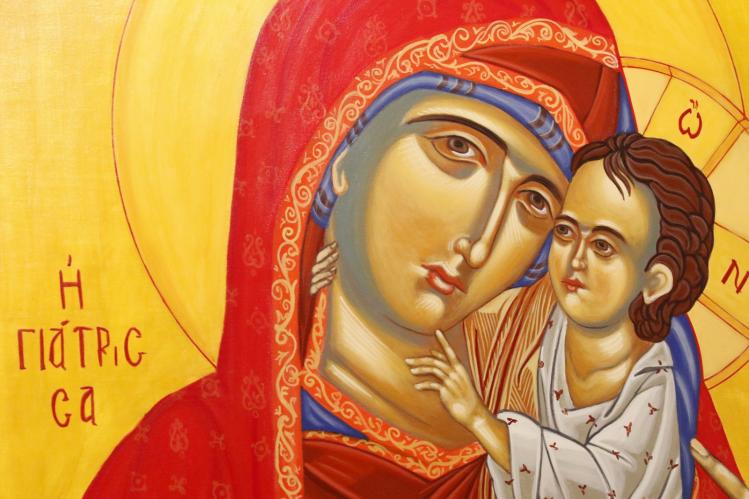
In the Christ child, God chose to need us. This is the message of Christmas: the profound vulnerability of the divine as it divests itself of glory in order to assume the form of a fragile creature—and a baby at that.
But babies grow up, and so did Jesus. From youth to adulthood he progressed, and as he grew in wisdom and stature he left behind childish ways. Indeed, he asserted his adult prerogatives regularly: by distancing himself from his parents in the temple, making a whip and driving out moneychangers, excoriating the religious leaders of his day, taking charge and raising the dead when the time was right. Behold Christ the man.
Does that mean his childhood was left behind as a mere stepping stone for the serious adult business of the redemption of the world? No. If we believe that Jesus is the revelation of the Father, then he must be so at every stage of his life, and we have good reason to think that the first years of Christ’s life occupy a privileged place in our interpretation of the rest of the Gospel story.
This may seem like a counterintuitive claim: How can Christ’s childhood, which is not even mentioned in the gospels of Mark and John, hold such theological weight? But the fact is that Christ repeatedly privileges childhood as the defining mark of redeemed—and thus true—humanity: “Unless you become like a child, you cannot enter the kingdom of heaven” (Matthew 18:3); “To such as these belongs the kingdom of heaven” (Matthew 19:14). The gospels clearly teach that Christ came to make us children again. And that means we cannot understand the Incarnation properly if we miss that Christ the man never ceased to be Christ the child.
Consider the neediness of a child. Throughout Christ’s entire adult ministry we see that he retains this disposition as a daily reality: he depends on the financial contributions of the women who travel with him (Luke 8:1–3); he has no place to lay his head (Matthew 8:20); indeed, there is no pillow even for his final sleep, and had it not been for the tomb donated by Joseph of Arimathea, Christ would have been buried in a criminals’ pit. How similar all of this is to Jesus’ infancy, when a humble stable proved to be his first home. And just as he was swaddled as a baby by his mother Mary, so he would be swaddled by her after his death.
What of the Passion itself, in which Christ was led, like a child, where he “wouldst not” (John 21:18)? In every moment of his Passion he exhibited the vulnerability of childhood. He pleaded with his Father before his death, asking not to die while freely submitting to the Spirit’s illumination of God’s will. In his confrontation with Pilate, he refused to claim his rightful throne in the manner of the kings of this world, and was instead robed in scorn and crowned with thorns. In the end, he returned to the nakedness of his first days. Behold Christ the child.
Our Lord is truly meek and mild—and hidden like so many children who go unnoticed by us. His most obscure birth would be matched by an equally shrouded rebirth, his barely noted resurrection. Christ remains the invisible child in his ascended reign, concealed in the church’s sacraments and awaiting our response to his grace.
It should therefore come as no surprise that when we seek to encounter Christ today, we find him chiefly in the needy and helpless of this world. The Christ we meet in the vulnerable is the child Christ and none other. The hungry, the thirsty, the homeless, prisoners, refugees, the sick, and, of course, children themselves—all these carry in their bodies the vulnerability and dependency that never leave us, the openness to wounds and to love that is the privilege and risk of the child.
Children may be weak, helpless, needy, but they are not quiet: they demand the love that rightly belongs to them, the care, the affection, the embrace that will satisfy their small but capacious hearts. This cry of the Christ child is the weakness of God that St. Paul speaks of, and we are reminded of it every day by all the sorrows and disasters that befall us without heaven’s interference. Some of these take place on the world stage, others in the smaller theaters of our own communities: spouses divorcing, children abused and neglected, jobs lost, friends suffering from chronic illnesses that suffuse every conscious moment with pain—all these will not be overcome by the strong God, the God who storms in and brings justice to the brokenhearted in one fell swoop. I want my God to make bread from these stones, these stumbling blocks placed everywhere in life’s path. And yet my prayers for myself and for those I love rarely effect the visible change I desire. To claim God’s weakness is ultimately to own the inefficiency of a child in God’s providential ways.
Yet children can also break our hearts. And when our hearts break, the hardened soil is prepared to receive the good news of ultimately victorious love, which the Sower casts far and wide. If we come near to the suffering Christ child in our midst, if we pick him up and hold him, he will water our hearts with his tears; up will grow the fruits of faith, hope, and love. And if we, as the Christmas hymn invites us, “come to own him” this season, he will come to own us too, and we will know his strength—the strength of a child who grasps us by the neck and will not let us go.
